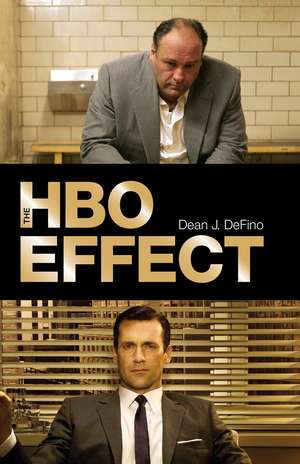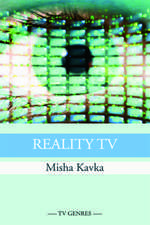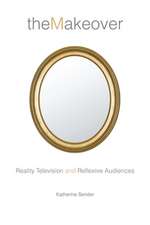The HBO Effect
Autor Dr. Dean J. DeFinoen Limba Engleză Paperback – 15 ian 2014
Preț: 108.09 lei
Preț vechi: 176.86 lei
-39% Nou
Puncte Express: 162
Preț estimativ în valută:
20.68€ • 22.12$ • 17.25£
20.68€ • 22.12$ • 17.25£
Carte tipărită la comandă
Livrare economică 17 aprilie-01 mai
Preluare comenzi: 021 569.72.76
Specificații
ISBN-13: 9780826421302
ISBN-10: 082642130X
Pagini: 256
Ilustrații: 25 illus
Dimensiuni: 140 x 216 x 25 mm
Greutate: 0.34 kg
Editura: Bloomsbury Publishing
Colecția Bloomsbury Academic
Locul publicării:New York, United States
ISBN-10: 082642130X
Pagini: 256
Ilustrații: 25 illus
Dimensiuni: 140 x 216 x 25 mm
Greutate: 0.34 kg
Editura: Bloomsbury Publishing
Colecția Bloomsbury Academic
Locul publicării:New York, United States
Caracteristici
Offers a comprehensive account of HBO's impact upon contemporary television and popular culture
Notă biografică
Dean J. DeFino is Associate Professor of English and Director of Film Studies at Iona College in New Rochelle, New York, USA. His previous publications include Faster, Pussycat! Kill! Kill! (forthcoming), and numerous essays on a range of subjects, from The Sopranos to The Maltese Falcon to Trailer Park Boys.
Cuprins
Acknowledgements1. The Visible Effect2. A Great Notion3. The Caterpillar4. Everything. Everyone. Everywhere. Ends.5. Changing the Conversation6. Serious Naked Pictures7. Win or DieNotesBibliographyIndexIndex
Recenzii
This book turns the HBO story inside out and productively repositions what we think we know about the premium pay-TV company within a broader historical and institutional history of US culture and television.
The HBO Effect is not the first book on HBO, but 'it's not TV' criticism in any ordinary sense. It's water cooler study criticism that will have scholars of the medium and serious viewers buzzing about this well written, engaging, funny, and constantly surprising investigation. Dean J. DeFino succeeds brilliantly in establishing his central contention: that HBO 'is itself a by-product of [the] long history [of television], not some aberration.'
Summarized.
In The HBO Effect, DeFino (Iona College) demonstrates that HBO is fully embedded within a long history of "quality television" storytelling and uses its positions to take risks and walk the line between complexity and popularity. The book notes HBO so-called showrunners created "quality television" for networks long before working with HBO. Although the book can be applauded for its attention to early stand-up comedy and "sex-docs" like Cathouse, which others often ignore, DeFino's focus on character studies and comparative analysis (for example, a lengthy comparison of The West Wing and The Sopranos) does not provide much in terms of cable history that cannot be found elsewhere thoughtful television criticism, but the book could have been strengthened by engaging more thoroughly with scholarship that tackles issues of narrative complexity and industry studies. Less-experiences readers will likely enjoy the book, but specialists will leave wanting more."-Summing Up: Recommended. Lower-division undergraduates; general readers.--
The HBO Effect is not the first book on HBO, but 'it's not TV' criticism in any ordinary sense. It's water cooler study criticism that will have scholars of the medium and serious viewers buzzing about this well written, engaging, funny, and constantly surprising investigation. Dean J. DeFino succeeds brilliantly in establishing his central contention: that HBO 'is itself a by-product of [the] long history [of television], not some aberration.'
Summarized.
In The HBO Effect, DeFino (Iona College) demonstrates that HBO is fully embedded within a long history of "quality television" storytelling and uses its positions to take risks and walk the line between complexity and popularity. The book notes HBO so-called showrunners created "quality television" for networks long before working with HBO. Although the book can be applauded for its attention to early stand-up comedy and "sex-docs" like Cathouse, which others often ignore, DeFino's focus on character studies and comparative analysis (for example, a lengthy comparison of The West Wing and The Sopranos) does not provide much in terms of cable history that cannot be found elsewhere thoughtful television criticism, but the book could have been strengthened by engaging more thoroughly with scholarship that tackles issues of narrative complexity and industry studies. Less-experiences readers will likely enjoy the book, but specialists will leave wanting more."-Summing Up: Recommended. Lower-division undergraduates; general readers.--














